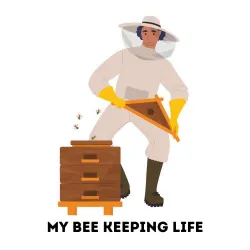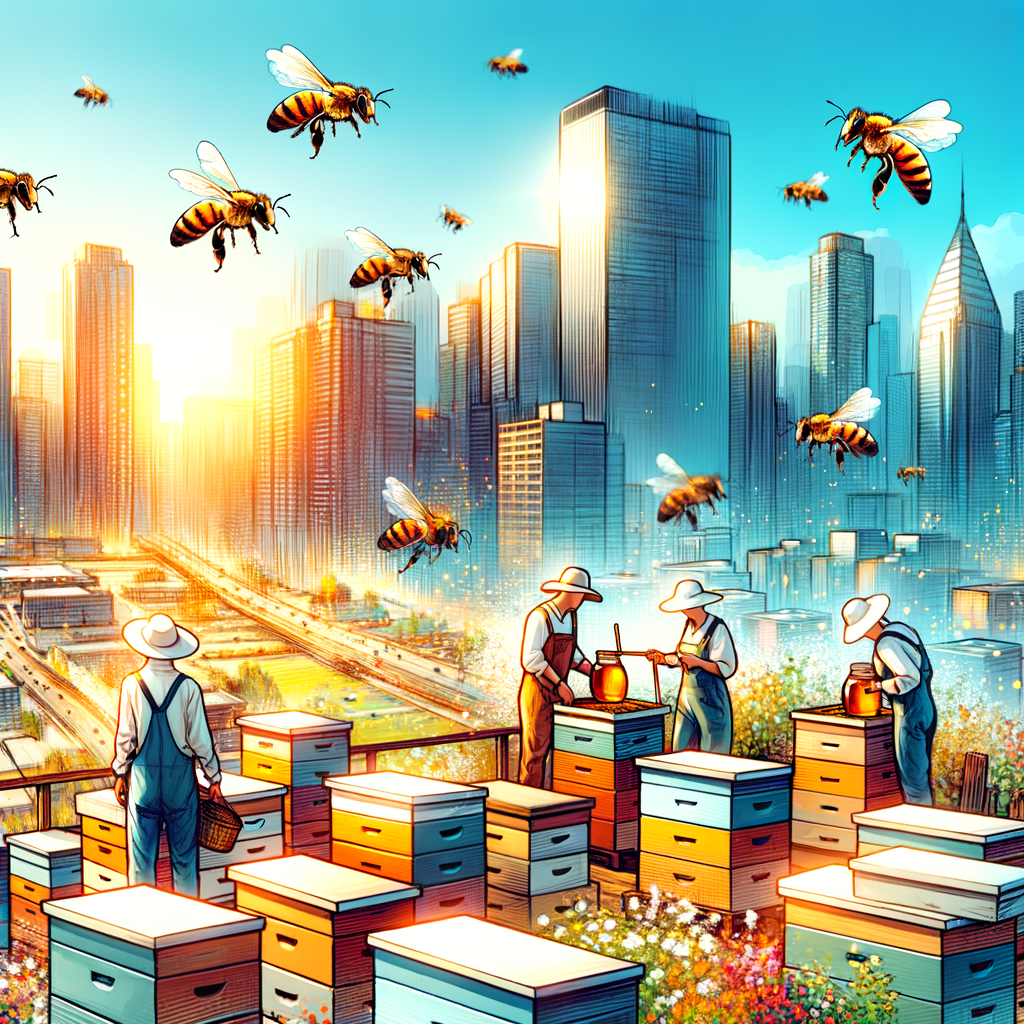
Introduction to Beekeeping Policies
Welcome to the exciting world of beekeeping! Before we dive into the nitty-gritty details, it’s crucial to understand the importance of beekeeping policies and the common regulations that govern this practice. These rules are not just there to make life difficult for beekeepers. They are designed to protect the bees, the environment, and the quality of the honey produced.
- The Importance of Understanding Beekeeping Policies
Why should you care about beekeeping policies? Well, for starters, bees play a vital role in our ecosystem. They help pollinate plants, which in turn helps our food grow. But bees are facing many challenges, from diseases to loss of habitat. Beekeeping policies are designed to help protect these valuable creatures.
Moreover, understanding these policies can help you avoid legal troubles. For example, some areas have strict rules about where you can place your hives. If you’re not aware of these rules, you could end up with hefty fines. Plus, knowing the policies can help you provide the best care for your bees, resulting in better honey production.
- Overview of Common Beekeeping Regulations
Now that we’ve covered why understanding beekeeping policies is important, let’s take a look at some common regulations. Please note that these can vary depending on your location, so it’s always a good idea to check with your local authorities.
| Regulation | Description |
|---|---|
| Hive Placement | There may be rules about where you can place your hives. For example, they might need to be a certain distance from property lines or buildings. |
| Hive Inspection | Some areas require regular hive inspections to check for diseases and pests. You may need to keep records of these inspections. |
| Honey Labeling | If you’re selling your honey, there may be rules about how you can label it. This can include information about the origin of the honey and its purity. |
Remember, these are just a few examples of common beekeeping regulations. Always check with your local authorities to ensure you’re following the correct rules. In our next section, we’ll dive deeper into understanding beekeeping laws. Stay tuned!
Understanding Beekeeping Laws
Let’s delve into the world of beekeeping laws. These laws are crucial for maintaining harmony between beekeepers, their neighbors, and the environment. They also ensure the health and safety of the bees themselves.
- Why beekeeping laws exist
- Common beekeeping laws around the world
Beekeeping laws exist to protect both the bees and the people. Bees are essential for our ecosystem as they pollinate plants, contributing to the growth of fruits, vegetables, and flowers. However, if not properly managed, bees can also pose risks to people and property. Laws help to regulate beekeeping practices, ensuring that bees can do their important work without causing problems for humans.
While beekeeping laws vary from one country to another, there are some common themes. Most laws regulate where and how hives can be kept, to prevent issues with neighbors or local wildlife. For example, hives may need to be a certain distance from property lines or public spaces. Some laws also require beekeepers to register their hives, so that local authorities can keep track of bee populations and health. In many places, beekeepers are also required to manage their bees in a way that minimizes swarming and aggression, to protect the public.
Understanding these laws is an important part of responsible beekeeping. By following the rules, beekeepers can contribute to the health of our ecosystems while also maintaining good relationships with their communities.
Beekeeping Legislation in the United States
Understanding the laws that govern beekeeping in the United States is vital for anyone interested in this activity. These laws are designed to protect both the beekeepers and the bees, ensuring a healthy and sustainable beekeeping industry. Let’s delve into the specifics of these laws.
- Federal Beekeeping Laws
- State-specific Beekeeping Laws
The United States Department of Agriculture (USDA) oversees federal laws related to beekeeping. One of the key federal laws is the Honey Bee Act of 1922, which restricts the importation of live honey bees into the U.S. to prevent the spread of diseases and pests. The USDA also provides guidelines on bee management and health, including the treatment of bee diseases and pests.
Another significant federal law is the Pollinator Protection Act. This law aims to protect the nation’s pollinators, including honey bees, by promoting conservation, research, and outreach. It also encourages the development of best management practices for beekeeping.
Along with federal laws, each state in the U.S. has its own specific laws regarding beekeeping. These laws often cover areas such as hive registration, hive inspection, disease control, and zoning regulations. For example, in California, all beekeepers are required to register their hives with the county agricultural commissioner. In Florida, beekeepers must have their hives inspected annually for diseases and pests.
It’s important to note that these laws can vary greatly from state to state. Therefore, beekeepers must familiarize themselves with the specific laws in their state to ensure they are in compliance.
In conclusion, understanding and complying with the federal and state-specific beekeeping laws is crucial for anyone involved in beekeeping in the United States. These laws are in place to protect the bees, the beekeepers, and the environment. By following these laws, beekeepers can contribute to a healthy and sustainable beekeeping industry.
| Federal Law | Description |
|---|---|
| Honey Bee Act of 1922 | Restricts the importation of live honey bees into the U.S. to prevent the spread of diseases and pests. |
| Pollinator Protection Act | Promotes conservation, research, and outreach to protect the nation’s pollinators, including honey bees. |
Remember, each state has its own specific laws, so be sure to check with your local agricultural department or beekeeping association for the most accurate information.
Beekeeping Legislation in Europe
In Europe, beekeeping is governed by a mix of EU-wide laws and country-specific regulations. These laws are designed to protect both the bees and their keepers, ensuring a sustainable and healthy beekeeping industry.
- EU-wide Beekeeping Laws
The European Union has established a set of laws that apply to all member countries. These laws focus on several key areas:
- Bee Health: The EU has strict regulations to prevent the spread of diseases and pests that can harm bees. This includes mandatory inspections and reporting of any unusual bee deaths.
- Honey Quality: The EU sets high standards for honey quality to ensure consumers are getting a safe and pure product. This includes rules about labeling, which must accurately reflect the honey’s origin and composition.
- Support for Beekeepers: The EU provides financial support to beekeepers through the Common Agricultural Policy (CAP). This helps to maintain the bee population and supports the production of high-quality honey.
- Country-Specific Beekeeping Laws
While the EU provides a broad framework, each country in Europe also has its own specific laws related to beekeeping. These laws can vary greatly from one country to another. For example:
| Country | Specific Law |
|---|---|
| France | French law requires beekeepers to register their hives with the local municipality and to report any significant losses of bees. |
| Germany | In Germany, beekeepers must register with the veterinary office and are subject to regular inspections. |
| United Kingdom | The UK has specific laws regarding the movement of bees and hives to prevent the spread of disease. |
It’s important for beekeepers to understand both the EU-wide laws and the specific laws in their own country. This will help them to keep their bees healthy, produce high-quality honey, and avoid any legal issues.
Beekeeping Policies Guide
Understanding and navigating beekeeping policies can be a daunting task, especially for beginners. However, with the right guidance and resources, it becomes a manageable task. This guide will provide you with the necessary steps and insights to navigate beekeeping policies effectively and understand the implications of non-compliance.
- How to navigate beekeeping policies
- Understanding the implications of non-compliance
Understanding beekeeping policies begins with familiarizing yourself with the laws and regulations that govern beekeeping in your area. These laws vary from one region to another and are put in place to ensure the safety and health of both the bees and the people around them. It’s essential to read and understand these policies thoroughly. If you have any questions or doubts, don’t hesitate to seek clarification from local beekeeping associations or agricultural extension services. They are often more than willing to help.
Non-compliance with beekeeping policies can have serious implications. These can range from fines and penalties to the confiscation of your bees and equipment. In some cases, non-compliance can even lead to legal action. Therefore, it’s crucial to understand and adhere to all beekeeping policies. Remember, these policies are not just rules to follow; they are guidelines designed to ensure the well-being of your bees and the safety of your community.
By understanding and following the beekeeping policies, you not only protect your bees and your beekeeping practice, but you also contribute to the sustainability and growth of the beekeeping industry as a whole.
Beekeeping Policy Navigation
Understanding and navigating beekeeping policies can be a daunting task. However, with the right steps and resources, you can ensure compliance and stay updated on policy changes. Let’s delve into these aspects.
-
Steps to Ensure Compliance with Beekeeping Policies
Compliance with beekeeping policies is crucial for the sustainability of your beekeeping activities. Here are some simple steps to ensure you are always in line with the policies:
- Understand the Policies: The first step is to thoroughly understand the policies. This involves reading and interpreting the laws and regulations related to beekeeping in your area.
- Implement the Policies: Once you understand the policies, the next step is to implement them. This could involve making changes to your beekeeping practices to align with the policies.
- Regular Checks: Regularly check to ensure you are still compliant. This could involve periodic inspections of your beekeeping operations.
- Record Keeping: Keep detailed records of your beekeeping activities. This can serve as proof of compliance in case of any disputes or inspections.
-
Resources for Staying Updated on Policy Changes
Staying updated on policy changes is equally important. Here are some resources that can help:
- Beekeeping Associations: Joining local or national beekeeping associations can be a great way to stay informed about any changes in policies.
- Government Websites: Government websites often post updates about changes in policies. Make it a habit to regularly check these websites.
- Beekeeping Forums: Online beekeeping forums can be a good source of information. Members often share updates about policy changes.
- Newsletters: Subscribing to beekeeping newsletters can also keep you informed about policy changes.
Navigating beekeeping policies does not have to be complex. With the right steps and resources, you can ensure compliance and stay updated on policy changes. Remember, the goal is to promote sustainable and responsible beekeeping.
Beekeeping Rules and Regulations
Understanding the rules and regulations of beekeeping is essential for every beekeeper. These guidelines not only ensure the safety and well-being of the bees but also protect the beekeepers. Let’s delve into the key rules every beekeeper should know and how these regulations protect both parties involved.
- Key rules every beekeeper should know
- Registration: In many areas, beekeepers must register their hives with local authorities. This helps track the health of local bee populations and prevent the spread of diseases.
- Hive Maintenance: Beekeepers are required to maintain their hives in a clean and healthy condition to prevent the spread of diseases and pests.
- Location of Hives: There are often regulations about where hives can be placed. These rules are designed to minimize conflicts with neighbors and protect bees from environmental hazards.
- Swarm Control: Beekeepers are responsible for controlling swarming, a natural behavior of bees that can be disruptive or even dangerous to the public.
- How regulations protect both beekeepers and bees
- Protecting Bees: Rules about hive maintenance and swarm control help prevent the spread of diseases and pests, which can decimate bee populations. By following these rules, beekeepers help ensure the survival of their bees and the overall health of local bee populations.
- Protecting Beekeepers: Registration requirements help authorities keep track of beekeepers and provide them with important information about disease outbreaks, pest problems, and other issues that could affect their hives.
- Protecting the Public: Regulations about the location of hives and swarm control are designed to minimize conflicts with the public and prevent potentially dangerous situations.
There are several important rules that every beekeeper should be aware of:
These are just a few examples. The specific rules can vary by location, so it’s important for beekeepers to familiarize themselves with the regulations in their area.
Regulations are in place not only to protect the bees, but also the beekeepers and the public. Here’s how:
By understanding and following these rules and regulations, beekeepers can contribute to the well-being of their bees, protect themselves, and maintain good relations with their community.
Legal Issues in Beekeeping
As a beekeeper, it’s important to understand the legal aspects of your craft. Just like any other profession, beekeeping comes with its own set of rules and regulations. In this section, we will discuss some of the common legal issues faced by beekeepers and how you can avoid falling into these legal pitfalls.
- Common legal issues faced by beekeepers
There are several legal issues that beekeepers commonly face. These include:
- Zoning laws: Some areas have specific rules about where you can keep bees. For example, you might not be allowed to keep bees in residential areas or near schools. It’s important to check with your local government to find out what the rules are in your area.
- Health and safety regulations: Beekeeping can be dangerous, both for the beekeeper and for people nearby. There are often rules about how you must handle your bees to keep everyone safe. This might include wearing protective clothing, using smoke to calm the bees, and keeping the hives in a secure location.
- Endangered species laws: Some types of bees are protected by law. If you accidentally capture a protected species, you could face legal consequences. It’s important to know what types of bees are in your area and how to identify them.
- How to avoid legal pitfalls in beekeeping
Here are some tips to help you avoid legal issues in beekeeping:
- Stay informed: Laws and regulations can change, so it’s important to stay up-to-date. Join a local beekeeping association, attend meetings, and read industry publications to keep informed.
- Follow the rules: It might seem obvious, but the best way to avoid legal trouble is to follow the rules. If you’re not sure about something, ask for clarification. It’s better to ask a question than to make a mistake.
- Get insured: Insurance can protect you if something goes wrong. For example, if someone gets stung by one of your bees and decides to sue, insurance can help cover the costs.
Remember, the goal is to enjoy the rewarding practice of beekeeping while respecting the law and the safety of others. By staying informed and following the rules, you can avoid most legal issues in beekeeping.
Beekeeping Policy Compliance
As we delve deeper into the world of beekeeping, it’s essential to understand the importance of policy compliance. Following these rules not only ensures the health and safety of your bees, but it also safeguards your beekeeping operation from legal issues.
- Importance of Policy Compliance in Beekeeping
- Consequences of Non-Compliance
Adhering to beekeeping policies is not just about ticking off a checklist. It’s about ensuring the well-being of your bees and the sustainability of your beekeeping practice. These policies are designed to protect bees from diseases, pests, and other threats. They also guide beekeepers on best practices for hive management, honey extraction, and bee health monitoring.
For instance, some policies require beekeepers to register their hives, which helps local authorities keep track of bee populations and monitor potential disease outbreaks. Other policies dictate how hives should be maintained to prevent the spread of harmful pests or diseases. By complying with these policies, you are contributing to the overall health and success of the beekeeping industry.
Non-compliance with beekeeping policies can have serious consequences. For starters, you could face fines or legal action. In some cases, non-compliance can lead to the loss of your beekeeping license. But the impact goes beyond legal repercussions.
Ignoring these policies can put your bees at risk. For example, if you fail to follow guidelines on disease prevention, your hives could become infected, leading to a significant loss in your bee population. This not only impacts your honey production but also affects local ecosystems that rely on bees for pollination.
Furthermore, non-compliance can harm the broader beekeeping community. Diseases and pests can spread from one hive to another, so one beekeeper’s non-compliance could have far-reaching effects. Therefore, it’s crucial that all beekeepers understand and adhere to these policies.
In conclusion, policy compliance in beekeeping is not just a legal requirement – it’s a responsibility towards our bees, our environment, and our community. So, let’s strive to be responsible beekeepers, for the love of bees and the love of beekeeping.
Beekeeping Policy Updates
As a beekeeper, it’s crucial to stay informed about the latest policy updates. These changes can have a significant impact on your beekeeping practices. Let’s delve into the importance of staying updated and the potential effects of policy updates.
- Staying updated with the latest beekeeping policies
Staying updated with the latest beekeeping policies is not just about compliance. It’s about ensuring the health and sustainability of your bee colonies. Policies often change in response to new research findings, environmental concerns, and societal needs. For instance, a recent policy update might restrict the use of certain pesticides that have been found to harm bees. By staying informed, you can adapt your practices accordingly and ensure the well-being of your bees.
- Impact of policy updates on beekeeping practices
Policy updates can significantly impact beekeeping practices. For example, a new policy might require beekeepers to register their hives, change their hive management practices, or even relocate their hives to protect local ecosystems. Such changes can be challenging, but they are often necessary for the greater good of the environment and the beekeeping community.
Let’s consider a hypothetical case. Suppose a new policy restricts the use of a popular pesticide due to its harmful effects on bees. As a beekeeper, you would need to find an alternative pest management solution. This could mean more time and resources spent on pest control, but it would ultimately benefit your bees and contribute to the overall health of the bee population.
As you can see, staying updated with the latest beekeeping policies and understanding their impact on your practices is vital. It helps you adapt, thrive, and contribute positively to the beekeeping community and the environment.
Conclusion: Navigating the Maze of Beekeeping Policies
As we reach the end of our journey through the labyrinth of beekeeping policies, it’s essential to consolidate our understanding and reflect on the importance of these laws and regulations. Let’s summarize the key takeaways and share some final thoughts.
- Key takeaways about beekeeping policies
- Final thoughts on the importance of understanding beekeeping laws and regulations
Firstly, beekeeping policies are not just a set of rules, but a framework designed to protect both the beekeepers and the bees. They ensure that beekeeping practices are sustainable, ethical, and beneficial for the environment. For instance, policies around hive placement help prevent the spread of diseases among bee populations, while zoning laws ensure that beekeeping activities do not disturb residential areas.
Secondly, these policies vary significantly from one region to another. It’s crucial for beekeepers to familiarize themselves with the specific laws and regulations in their area. This includes understanding the legal requirements for hive registration, disease control, and honey production and sales.
Lastly, staying updated with policy changes is a responsibility that every beekeeper should take seriously. Changes in beekeeping policies often reflect new scientific findings about bee health and behavior. By keeping abreast of these updates, beekeepers can adapt their practices to better support their bees.
Understanding and complying with beekeeping laws and regulations is not just a legal obligation, but a commitment to the welfare of our bees and the environment. As beekeepers, we hold the responsibility of safeguarding these incredible creatures that play a crucial role in our ecosystem.
By adhering to the policies, we can ensure that our beekeeping practices contribute positively to the environment and the bee populations. Moreover, it helps us build trust and respect within our communities, paving the way for a more sustainable and bee-friendly world.
In conclusion, navigating the maze of beekeeping policies may seem daunting, but it’s a journey worth undertaking. As we continue to learn and adapt, we become better beekeepers, contributing to a healthier planet and a brighter future for our bees.








